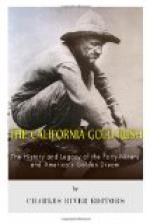The deliberations of this body are very interesting reading. Such a subject is usually dry in the extreme; but here we have men assembled from all over the world trying to piece together a form of government from the experiences of the different communities from which they originally came. Many Spanish Californians were represented on the floor. The different points brought up and discussed, in addition to those finally incorporated in the constitution, are both a valuable measure of the degree of intelligence at that time, and an indication of what men considered important in the problems of the day. The constitution itself was one of the best of the thirty-one state constitutions that then existed. Though almost every provision in it was copied from some other instrument, the choice was good. A provision prohibiting slavery was carried by a unanimous vote. When the convention adjourned, the new commonwealth was equipped with all the necessary machinery for regular government.[3]
[3: The constitution was ratified by popular vote, November 13, 1849; and the machinery of state government was at once set in motion, though the State was not admitted into the Union until September 9. 1850.]
It is customary to say that the discovery of gold made the State of California. As a matter of fact, it introduced into the history of California a new solvent, but it was in no sense a determining factor in either the acquisition or the assuring of the American hold. It must not be forgotten that a rising tide of American immigration had already set in. By 1845 the white population had increased to about eight thousand. At the close of hostilities it was estimated that the white population had increased to somewhere between twelve and fifteen thousand. Moreover this immigration, though established and constantly growing, was by no means topheavy. There was plenty of room in the north for the Americans, and they were settling there peaceably. Those who went south generally bought their land in due form. They and the Californians were getting on much better than is usual with conquering and conquered peoples.
But the discovery of gold upset all this orderly development. It wiped out the usual evolution. It not only swept aside at once the antiquated Mexican laws, but it submerged for the time being the first stirrings of the commonwealth toward due convention and legislation after the American pattern. It produced an interim wherein the only law was that evolved from men’s consciences and the Anglo-Saxon instinct for order. It brought to shores remote from their native lands a cosmopolitan crew whose only thought was a fixed determination to undertake no new responsibilities. Each man was living for himself. He intended to get his own and to protect his own, and he cared very little for the difficulties of his neighbors. In other words, the discovery of gold offered California as the blank of a mint to receive the impress of a brand new civilization. And furthermore it gave to these men and, through them, to the world an impressive lesson that social responsibility can be evaded for a time, to be sure, but only for a time; and that at the last it must be taken up and the arrears must be paid.




